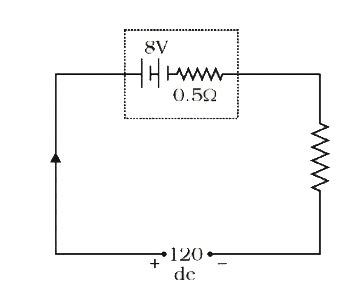A storage battery of emf 8.0 V and internal resistance 0.5Ω is being charged by a 120V dc supply using a series resistor of 15.5Ω. what in the terminal voltage of the battery during charging ? What is the purpose of having a series resistor in the charging circuit?
Net emf in the circuit when the battery of emf 8.0V is charged by a 120V d.c supply is
Enet=E2−E1=120−8.0=112.0V
Current in the circuit during charging will be
I=EnetR+r
Here, R=15.5Ωandr=0.5Ω
⇒I=11215.5+0.5=7A
For charging the battery, the terminal voltage is given by:
V=E1=Ir
=8+7×0.5=8+3.5=11.5V
The series resistor helps in limiting the current drawn from the external source because if it is not present, the current drawn from the source will be high and can exceed the maximum allowed current in the battery being charged.

Topper's Solved these Questions
- CURRENT ELECTRICITYBOOK - MODERN PUBLICATIONCHAPTER - CURRENT ELECTRICITYEXERCISE - NCERT SOLVED (NCERT Additional Exercises)
11 Videos
- CURRENT ELECTRICITYBOOK - MODERN PUBLICATIONCHAPTER - CURRENT ELECTRICITYEXERCISE - NCERT SOLVED (NCERT Exemplar Problems Subjective Questions)(Very Short Answers Type Questions)
10 Videos
- CURRENT ELECTRICITYBOOK - MODERN PUBLICATIONCHAPTER - CURRENT ELECTRICITYEXERCISE - TOUGH AND TRICKY PROBLEMS
23 Videos
- ATOMS BOOK - MODERN PUBLICATIONCHAPTER - ATOMS EXERCISE - Chapter Practice Test
16 Videos
- DUAL NATURE OF RADIATION AND MATTER BOOK - MODERN PUBLICATIONCHAPTER - DUAL NATURE OF RADIATION AND MATTER EXERCISE - CHAPTER PRACTICE TEST
15 Videos
Similar Questions
A storage battery of emf 8.0 V and internal resistance 0.5 Ω is being charged by a 120 Ω d.c. supply using a series resistor of 15.5 Ω . What is the terminal voltage of the battery during charging ? What is the purpose of having a series resistor in the charging circuit ?
View SolutionA storage battery of emf 8V and internal resistance is being charged by a 120 V D.C. supply using a series resistor of What is the terminal voltage of the battery during charging? What is the purpose of having a series resistor in the charging circuit?

View Solution
Knowledge Check
A battery of emf 8 V with internal resistance 0.5Ω is being charged by a 120 V dc supply using a series resistance of 15.5Ω. The terminal voltage of the battery is
A20.5 VB15.5 VC11.5 VD2.5 VA battery of EMF 10 V, with internal resistance 1Ω is being charged by a 120 V d.c. supply using a series resistance of 10Ω. The terminal voltage of the battery is
A20 VB10 VCZeroD30 V
A storage battery of emf 8V and internal resistance is being charged by a 120 V D.C. supply using a series resistor of What is the terminal voltage of the battery during charging? What is the purpose of having a series resistor in the charging circuit?

View SolutionA storage battery is of emf 8V and internal resistance 0.5 ohm is being charged by d.c supply of 120 V using a resistor of 15.5 ohm
a) Draw the circuit diagram.
b) Calculate the potential difference across the battery.
c) What is the purpose of having series resistance in this circuit?
View SolutionA cell of emf 4V and internal resistance 1Ω is being charged by DC source of 10V through resistor of 5Ω .Calculate the terminal voltage across the cell -
View Solution(i) A storage battery of emf 8V, internal resistance 1Ω is being charged by a 120V d.c. source using a 15Ω resistor in series in the circuit. Calculate the current in the circuit (ii) terminal voltage across the battery during charging and (ii) chemical energy stored in the battery in 5 minutes.
View SolutionA battery of emf 2.0V and internal resistance 0.10Ω is being charged with a current of 5.0A. Find the potential difference between the terminals of the battery?
View SolutionA car battery of emf 12 V and internal resistance 0.1 Ω is being charged at a constant current of 5 A. The potential difference between the two terminals of the battery is ______.
View Solution
